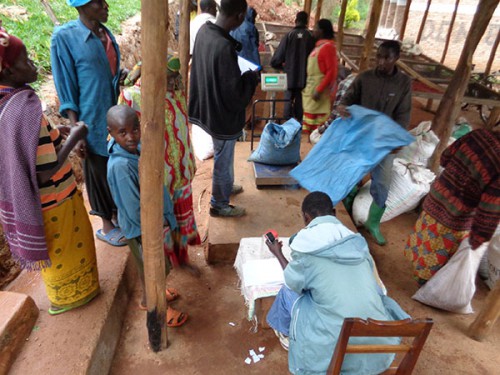Uncovering ‘the Root Cause’ of Declining Coffee Production in Rwanda - Determinants of Farmer Invest
Coffee production in Rwanda has declined and stagnated in recent decades. This report shows how failing to bring in the producers as full partners is one of the key reasons for this decline.
By Daniel C. Clay, Aniseh S. Bro, Ruth Ann Church, Alfred Bizoza, David L. Ortega
 Summary from: Feed the Future Innovation Lab for Food Security Policy Research Paper 32, October 2016
Summary from: Feed the Future Innovation Lab for Food Security Policy Research Paper 32, October 2016
Understanding when and why coffee farmers will invest their time and resources in their coffee trees is something like the ‘holy grail’ in the coffee industry. In Rwanda, this has been especially true because coffee production in Rwanda has declined and stagnated in recent decades. This report shows how failing to bring in the producers as full partners is one of the key reasons for this decline. Sub-par compensation for their cherry, an average of 24 percent below the revenues of their counterparts elsewhere in the region, has resulted in the neglect and disinvestment in coffee by many producers, particularly largeholder producers.
This research analysis is welcomed by industry stakeholders in Rwanda who, since 2001, have experienced a transformation in quality (fully-washed coffee) and in making the country a well-established player in specialty coffee markets around the globe. The study shows that the value-added from this transformation has been beneficial to Rwanda, yet the coffee producers have shared the least in the new prosperity.
Findings presented in this report show that the true cost of production in Rwanda, including household and wage labor, inputs and equipment, totals 177 RWF/Kg of cherry, a figure well above the 80 RWF/Kg cherry currently used as a reference for establishing cherry floor prices in Rwanda. As a result, a large proportion of growers suffer net losses in coffee (over one-third in 2015). Findings also show that end-of-year premium payments provide an important incentive for farmers to improve productivity. Farms that receive premiums (8.3 percent, on average) have an estimated productivity that is 26 percent higher than those that do not receive premiums, all else equal. These findings are especially germane to our understanding of farmer incentives. It demonstrates how sensitive farmers are to even small changes in remuneration.
Photo: “Weighing and paying.” After arriving at a washing station, farmers sort their cherry then wait for their turn to have their delivery weighed and officially received, in this case, by the Maraba cooperative. Huye, Rwanda, 2016 (Photo: Ruth Ann Church)Understanding when and why coffee farmers will invest their time and resources in their coffee trees is something like the ‘holy grail’ in the coffee industry. In Rwanda, this has been especially true because coffee production in Rwanda has declined and stagnated in recent decades. This report shows how failing to bring in the producers as full partners is one of the key reasons for this decline. Sub-par compensation for their cherry, an average of 24 percent below the revenues of their counterparts elsewhere in the region, has resulted in the neglect and disinvestment in coffee by many producers, particularly largeholder producers. Photo credit: Ruth Ann Church.



 Print
Print Email
Email
